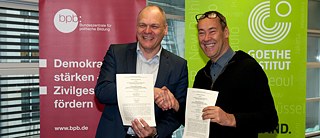Cooperation Agreement: Goethe-Institut / Federal Agency for Civic Education
Elective Affinities

The Goethe-Institut and the Federal Agency for Civic Education (bpb) are further expanding their existing cooperation. Johannes Ebert, secretary-general of the Goethe-Institut, and Thomas Krüger, president of the Federal Agency for Civic Education, spoke with us about the Cooperation Agreement they signed on 22 March 2018.
Mr Krüger, Mr Ebert, what do you value about each other’s institution? Where do you see similarities and interfaces?
Krüger: The Goethe-Institut’s asset of being present worldwide through culture and language and having direct connections to the most exciting people in the world is impressive. In the context of globalisation, we can no longer distinguish between domestic and foreign, but must focus on the permeable areas. The Goethe-Institut is one of the key institutions for promoting communication between Germany and abroad. So it is practically an ideal partner for us as an institution that had to travel very much within the German context until now, but that in recent years has rapidly networked internationally. Also, the fact that we look at the areas that are taboo or marginalised – here we have elective affinities in Goethe’s sense.
Promoting civil societies
Ebert: I find it remarkable how the Federal Agency for Civic Education has consistently developed and addresses the issues that are potent in Germany, issues of civil society. It has always developed new formats for this purpose. We are particularly interested in the agency’s experience in promoting civil societies. We therefore hope to learn from these approaches and to use our strengths together abroad and in Germany.What exactly does the Cooperation Agreement between the Goethe-Institut and Federal Agency for Civic Education contain?
Ebert: Cooperation in projects and publications. We conducted an exciting collaborative project last year called Sensitive Data with which we highlighted the cultural differences in data handling in Germany and the US. We organised civic education meetings in the Middle East and worked with our local partners in Eastern Europe on corruption issues in discursive and artistic formats. We want to expand this cooperation. We also want to exchange staff. In the contract we agreed that if it suggests itself, we can invite colleagues from the Federal Agency for Civic Education to regional work and strategy meetings of the Goethe-Institut and vice versa. This way, we can gain a view from the outside and learn from each other in a sustainable way.
Krüger: There are significant overlaps between Goethe-Institut and Federal Agency for Civic Education in terms of strategy and fields of work. The idea is to work in dual-channel cooperation. This means to let our sales channels in Germany and abroad correspond with each other in order to create synergy effects.
Do you already have concrete cooperation plans for the future?
Ebert: Many cultural institutions in the independent scene are organised in civil society. Based on this, we began to work more closely with civil society organisations in the 1990s. What are the cultural education challenges in each country? What can we offer from the German side? Both the Goethe-Institut and the Federal Agency for Civic Education have a platform function to bring civil society actors together. The agency is a pioneer in that. Now we can use each other’s networks to facilitate sustainable international networking. Civil society organisations that are under pressure abroad can benefit from international links. That gives them strength.
What’s not come up for debate
Krüger: We see ourselves as the activating, supporting motor of civil society, which acts through participation and acts as a cooperation partner. A democratic, heterogeneous society needs more civil society actors. We can seismographically pick up stimuli on what the discussions of tomorrow will be. Just think of the confrontation with Germany’s colonial past. It’s about opening our eyes to parts of the past that have not come up for debate.What subject matter do you want to tackle together?
Krüger: Digitisation is a global issue. It is important to bring the different cultural contexts into play and to open our eyes to economically critical perspectives. Artists can contribute to polarising and creating engagement. Another issue is that of exile, which needs to be put on the agenda more often given the many autocracies in the world. Our two institutions have a certain basic sensitivity to this.
Ebert: Another acute issue are political currents that aim to ostracise and are also getting the upper hand in many European countries. From today’s point of view, we cannot afford that anymore. That is why we need to make it clear that ostracism is harmful not only to our country, but also to Europe and to every individual. It is a major challenge to reach people who we have not yet reached with our programmes. Ecology is another important topic. As an educational institution, we must tackle it even more in future.